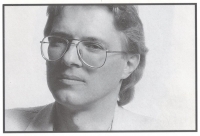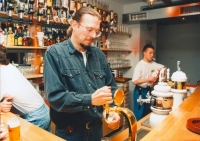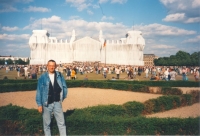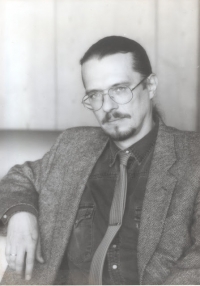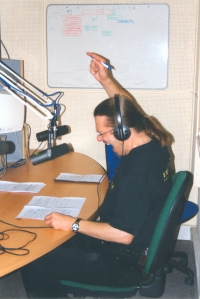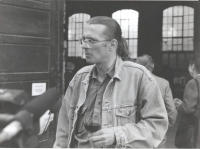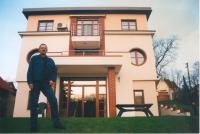“We, from the art underground, were essentially anti-communists.”
Bohuslav Kraus comes from a Czechoslovak family from Zvolen, where he was born on February 26, 1955. After 1948, his grandparents on the paternal side, who came from Moravia, nationalized the bookstore. In 1958, they were convicted on fabricated accusation and subsequently imprisoned. Their arrest and the visit of his grandfather to the Ilava prison affected the memorial’s attitude towards the communist regime for the rest of his life. When Bohuslav was ten years old, he moved with his mother to Bratislava. He spent the summer holidays in 1968 with his grandparents in Zvolen, where on August 21, he and his friends tried unsuccessfully to stop Soviet tanks in the city by sitting in front of them. In 1970 he began attending a mathematical grammar school. He belonged to a group of “hippies” with long hair and was expelled from school after the second year due to disputes with the deputy director and a negative attitude towards SZM. He was accepted to the School of Arts and Crafts (ŠUP-ku), where there was a relatively free and creative atmosphere that shaped him. From 1974 he was a member of the art and poetry group Degenerated Generation, later renamed the Temporary Society of Intense Survival, which organized art exhibitions and various events of conceptual art. In 1976, he began studying at the Faculty of Architecture in Bratislava, continued to work in underground art groups and participated in the publication of prohibited literature. After completing one year of compulsory military service, he worked for Dopravoprojekt. He participated in the meeting of the so-called secret church and worked with his longtime friend Ján Budaj in Bratislava/ aloud. In the revolutionary days after November 17, 1989, he was a member of the senior management of VPN, actively contributed to the dissolution of the paid Association of Architects of Slovakia and was a co-founder of the Association of Architects of Slovakia. He also actively participated in the exchange of academic officials at the Faculty of Architecture. He was one of the VPN candidates for the first free elections in June 1990, but was withdrawn from it after the forced resignation of Ján Budaj shortly before the elections. He left politics and VPN definitely after the assembly in Košice in April 1991 and subsequently devoted himself fully to architecture.







